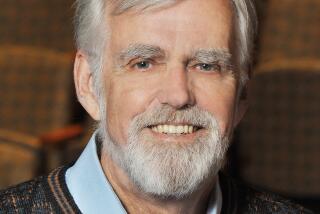STAGE REVIEW : A ‘Happy’ Ending to SCR’s Season
- Share via
“Happy End,” the season closer at South Coast Repertory, is indeed a happy end. Not too dark or too deep, you might call it a farcical musical satire about a mythical Chicago in 1919, littered with cops, robbers, Salvation Army sisters and unrelated songs about Kiplingesque figures wailing off the coast of Mandalay.
In a manner of singing.
It’s doubly delicious since productions of the Brecht-Weill “Happy End” don’t abound and since director Barbara Damashek has gone for the jocular rather than the jugular, keeping her tongue firmly lodged in her cheek. It’s a strange, entirely playful little satire, written by Bertolt Brecht and composed by Kurt Weill in 1929 in an effort to recreate the success (if not the polemics) they’d stirred up about a year before with “Threepenny Opera.”
“Happy End” is not in the same league, but in this lip-smacking 1972 adaptation by Michael Feingold (which found its way to Broadway in 1977), the accent is not on fading politics but on imaginative spoofing.
Harmless traces of the political anger of the time can be found in the prologue, a transposition of elements that were once part of Act III: magnified projections of a dollar bill in which the picture of George Washington is replaced by such capitalist eminences as J. P. Morgan, John D. Rockefeller and, for pure fun, the author and composer and the directors of the current theater.
But while the turmoil of 1929 Germany and the political convictions of its authors flavored the creation of “Happy End” (and make fascinating program reading), the piece today stands chiefly as historical artifact. It is a clunkily structured, uncommon comedy with music, in which we laugh as much at the ineptness of the plot as we do at the fun that is had with it.
A band of bungling, small-time extortionists and thieves, commanded by a mysterious woman known only as “The Fly” (Fran Bennett), run afoul of Salvation Army zealots--in particular pretty Lillian Holiday (Patricia Ben Peterson), aka Hallelujah Lil, who falls for fearsome Bill Cracker (Christopher Allport), the very crook she most wants to save.
You can just about cut to the chase from there, but the plot (whose origins are murky and which, as promised, has a happy ending) is incidental to the sight gags, stereotypes and atonal songs--most of them having little to do with the story, but many of them among Weill’s best, such as “The Bilbao Song,” “The Sailors’ Tango,” “Song of the Big Shot,” “The Mandalay Song” and “Surabaya Johnny.”
Damashek has been inventive. She’s included the suggestion of Keystone Kop routines, Rube Goldberg contraptions and other visual jokes that gleefully affirm the silliness of the story. Shigeru Yaji’s costumes for this ragtag band make comic statements in themselves. Cartoony shadow plays are part of Paulie Jenkins’ lighting design, and Ralph Funicello has created a deliberately grim context of racks and gears, broken mirrors and grime that switch from Bill’s Beer Hall (“a way station on the road to hell”) to the equally seedy Salvation Army Mission on Canal Street.
Standouts in the strong if not exceptional cast are Ron Boussom (as the sinister Dr. Nakamura), Robert Machray (big boy Sam “Mammy” Wurlitzer), Jane A. Johnston (a delightfully fumbling Major Stone), Bennett, Allport and Peterson. Feingold makes good use of anachronistic idiom to revitalize the piece (“This is the Fly buzzing off,” “What is this gang coming to?”), which makes one wonder about other updates.
In view of S&L; scandals, homelessness and mounting violence in the streets, political parallels to the 1990s abound in “Happy End.” Perhaps the faces on those giant dollar bills of the prologue should include the Boeskys and Milkens of this world and some more recent politicians. But then we might have a darker musical than even Brecht and Weill intended. And perhaps statement by indirection is enough.
‘Happy End’
David A. Penhale: The Professor
Hal Landon Jr.: The Reverend
Jerome Butler: Baby Face
Robert Machray Sam “Mammy” Wurlitzer
Ron Boussom: Dr. Nakamura
Leslie Ishii: Miriam
Christopher Allport: Bill Cracker
Fran Bennett: The Fly
Patricia Ben Peterson: Sister Lillian Holiday
Jane A. Johnston: Major Stone
Marshall Borden: Brother Hannibal Jackson
Holly Holsinger: Sister Mary
Bridget Connors: Sister Jane
Craig George: Brother Ben
Don Took, Tom Humphreys: The Cops
A musical with lyrics by Bertolt Brecht and music by Kurt Weill. Book attributed to Dorothy Lane. Book and lyrics adapted by Michael Feingold. Director Barbara Damashek. Sets Ralph Funicello. Lights Paulie Jenkins. Costumes Shigeru Yaji. Musical direction Dennis Castellano. Production manager Edward Lapine. Stage manager Bonnie Lorenger.
More to Read
The biggest entertainment stories
Get our big stories about Hollywood, film, television, music, arts, culture and more right in your inbox as soon as they publish.
You may occasionally receive promotional content from the Los Angeles Times.










